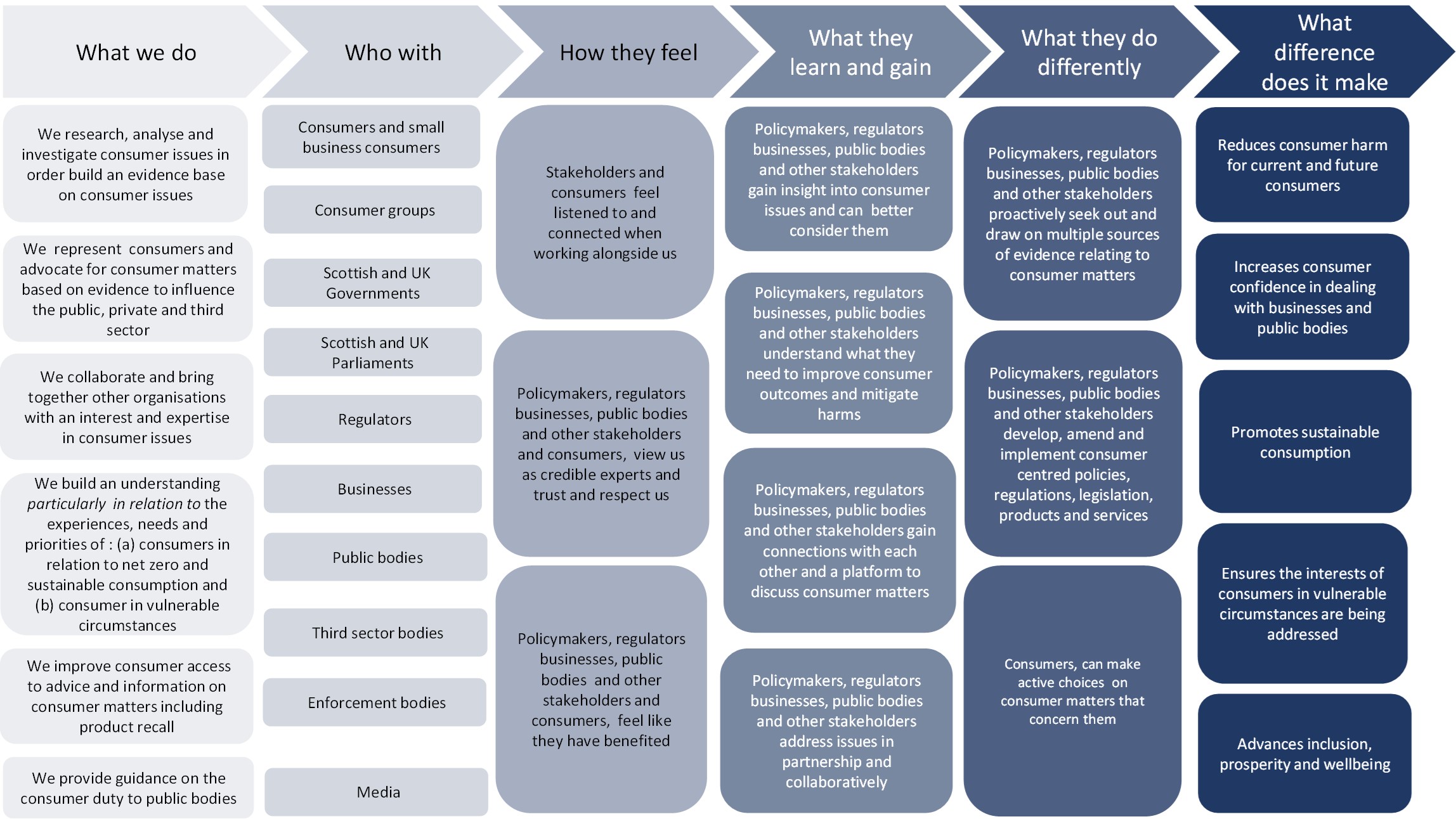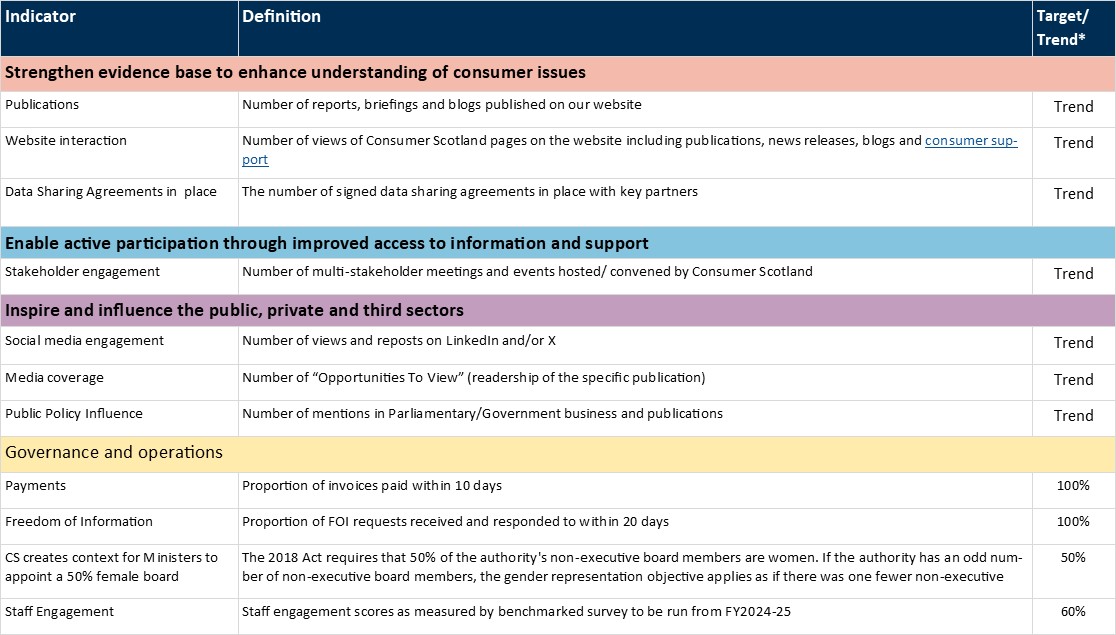1. Our Performance Framework
As a Non-Ministerial Office within the Scottish Administration, accountable to the Scottish Parliament, Consumer Scotland is committed to monitoring and being transparent about its performance.
The Consumer Scotland Act 2020 requires it to commission an independent review of its performance after its first three years and every subsequent five years. Consumer Scotland also prepares and lays before the Scottish Parliament its Annual Report and Accounts, which are subject to independent audit.
Consumer Scotland ’s Performance Framework is the means by which we measure our functioning as an organisation and the impact that our work has. Our approach is to use that information to improve our future performance.
Like other public sector bodies we measure how we perform against a range of measurable indicators. In addition, Consumer Scotland’s statutory advocacy role involves influencing and inspiring change across the public, private and third sectors.
Measuring our role in influencing change can be challenging, as policy change takes time and is usually the result of many influencing factors. Recognising this, our approach to measuring our impact involves a range of activities, including tracking the impact of our recommendations, and case studies of our impact.
Consumer Scotland’s Performance Framework has two core components:
Performance assessment
Monitoring and assessment of Consumer Scotland’s influence and impact through:
- a recommendations register
- impact assessment reviews
- workstream monitoring
Organisational activity indicators
- quantifiable activity
2. How we collaborate
Consumer Scotland seeks to work in collaboration with others. Our approach to assessing our influence and impact is based on contribution analysis which is reflective of the complexity of the sectors we work within and the broad range of actors within them.
Delivering and understanding impact is dependent on the knowledge, expertise and skills of our staff. Our approach to reviewing and evaluating impact is proportionate to the size of our organisation.
3. Recommendations register
Consumer Scotland makes recommendations that are relevant to a broad range of public, private and third sector organisations. These recommendations are usually initially made in written form, in reports, letters or blogs, though they may also be made verbally.
By their nature recommendations may be of minor, moderate or major significance.
Consumer Scotland will establish and maintain a register of all recommendations of moderate or major significance. While there is inevitably an element of judgement in determining the significance of a recommendation, Consumer Scotland will establish criteria for that assessment.
Consumer Scotland will track the progress of recommendations, reviewing and recording progress at regular intervals. As well as a tool for tracking the outcomes of our work the Recommendations Register will help maintain our focus on them in ongoing advocacy.
An update on the recommendations register will be included each year in Consumer Scotland’s Annual Report and Accounts.
4. Impact assessment reviews
Consumer Scotland will conduct two in-depth impact assessment reviews per year. A case study approach will be adopted which will consist of a ‘deep dive” to evaluate the impact of our work in an area to date and identify any lessons to be learnt.
The impact assessment reviews:
- Consider our impact
- Build capacity in terms of delivering and evidencing impact
Impact is defined as evidence of the difference we make. It is the demonstrable contribution that Consumer Scotland makes to public policy, the economy, society, the environment and quality of life and wellbeing.
Consumer Scotland’s approach to impact is informed by the strategic theory of change overleaf. While a single theory of change cannot fully encompass all of our work, the theory of change we have developed is sufficiently broad that it can be applied on an individual project, programme or organisational basis.
An update on our impact assessment reviews will be included each year in Consumer Scotland’s Annual Report and Accounts.
5. Strategic theory of change
Consumer Scotland has adopted a strategic theory of change model to help establish our influence.
The model establishes what we do, who we work with, how they feel, what they learn and gain, what they do differently and what difference it makes.
Strategic theory of change

What we do
- We research, analyse and investigate consumer issues in order build an evidence base on consumer issues
- We represent consumers and advocate for consumer matters based on evidence to influence the public, private and third sector
- We collaborate and bring together other organisations with an interest and expertise in consumer issues
- We build an understanding particularly in relation to the experiences, needs and priorities of consumers in relation to net zero and sustainable consumption and consumer in vulnerable circumstances
- We improve consumer access to advice and information on consumer matters including product recall
- We provide guidance on the consumer duty to public bodies
Who with
- Consumers and small business consumers
- Consumer groups
- Scottish and UK governments
- Scottish and UK parliaments
- Regulators
- Businesses
- Public bodies
- Third sector bodies
- Enforcement bodies
- Media
How they feel
Stakeholders and consumers feel listened to and connected when working alongside us
Policymakers, regulators, businesses, public bodies and other stakeholders and consumers view us as credible experts and trust and respect us
Policymakers, regulators businesses, public bodies and other stakeholders and consumers, feel like they have benefited
What they learn and gain
- Policymakers, regulators, businesses, public bodies and other stakeholders gain insight into consumer issues and can better consider them
- Policymakers, regulators, businesses, public bodies and other stakeholders understand what they need to improve consumer outcomes and mitigate harms
- Policymakers, regulators, businesses, public bodies and other stakeholders gain connections with each other and a platform to discuss consumer matters
- Policymakers, regulators, businesses, public bodies and other stakeholders address issues in partnership and collaboratively
What they do differently
- Policymakers, regulators, businesses, public bodies and other stakeholders proactively seek out and draw on multiple sources of evidence relating to consumer matters
- Policymakers, regulators, businesses, public bodies and other stakeholders develop, amend and implement consumer centred policies, regulations, legislation, products and services
- Consumers can make active choices on consumer matters that concern them
What difference does it make
- Reduces consumer harm for current and future consumers
- Increases consumer confidence in dealing with businesses and public bodies
- Promotes sustainable consumption
- Ensures the interests of consumers in vulnerable circumstances are being addressed
- Advances inclusion, prosperity and wellbeing
6. Workstream monitoring
Our approach to monitoring impact will be underpinned by the gathering of relevant, robust and proportionate evidence across the breadth of our activity, on an ongoing basis.
This evidence will inform the selection and production of the impact case studies and the monitoring of the recommendations register. It will also support our corporate governance, management and reporting cycles, including our Performance Report in our Annual Report and Accounts.
We will use a number of tools, including data sources, feedback and reflection to gather the relevant evidence. We will review and adapt these tools on a regular basis to ensure that they are fit for purpose.
7. Organisational activity indicators
We have four overarching organisational activities:
- Strengthen the evidence base to enhance understanding of consumer issues
- Enable active participation through improved access to information and support
- Inspire and influence the public, private and third sectors
- Deliver effective governance and operations
Organisational activity indicators

Each organisational activity has a series of individual indicators which are in turn defined by a set of key measurements.
To strengthen the evidence base to enhance understanding of consumer issues
Indicators and definitions
Publications: Number of reports, briefings and blogs published on our website: Trend
Website interaction: Number of views of Consumer Scotland pages on the website: Trend
Data sharing agreements: The number of signed data sharing agreements in place with key partners: Trend
Enable active participation through improved access to information and support
Stakeholder engagement: Number of multi-stakeholder meetings and events hosted/convened by Consumer Scotland: Trend
Inspire and influence the public, private and third sectors
Social media engagement: Number of views and reposts on social media channels: Trend
Media coverage: Number of “Opportunities To View” (readership of the specific publication): Trend
Public Policy Influence: Number of mentions in Parliamentary/Government business and publications: Trend
Governance and operations
Payments: Proportion of invoices paid within 10 days: 100%
Freedom of Information: Proportion of FOI requests received and responded to within 20 days: 100%
CS creates context for Ministers to appoint a 50% female board: The 2018 Act requires that 50% of the authority's non-executive board members are women. If the authority has an odd number of non-executive board members, the gender representation objective applies as if there was one fewer non-executive: 50%
Staff Engagement: Staff engagement scores as measured by benchmarked survey to be run from FY2024-2025: 60%